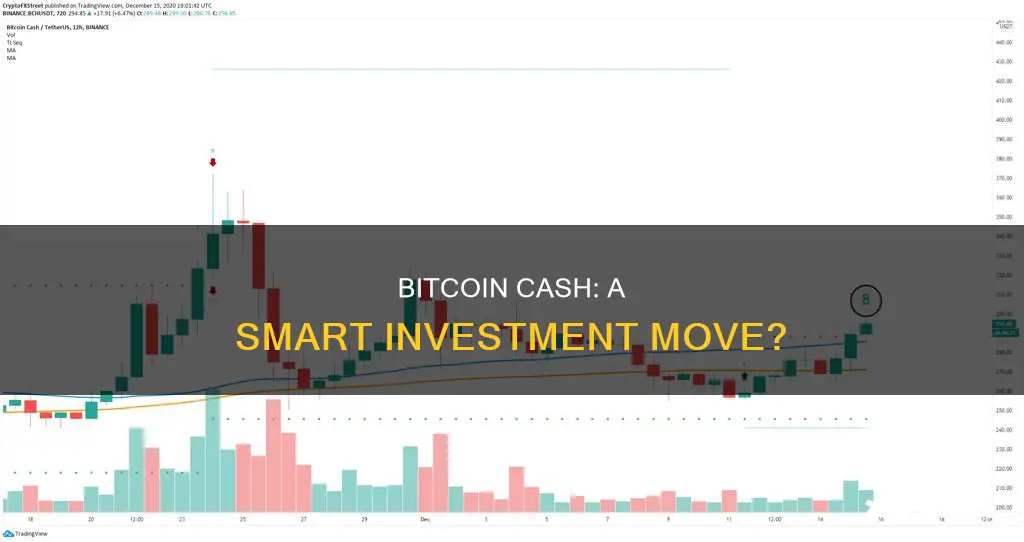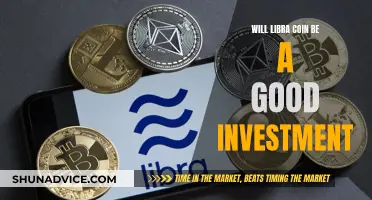
Bitcoin Cash (BCH) is a popular offshoot of the original Bitcoin blockchain. It was created to work more like a currency than a store of value, and it has sparked a great debate between supporters of Bitcoin and those who believe that Bitcoin needs to transact faster and cheaper. Bitcoin Cash is designed to be the digital equivalent of cash, while Bitcoin is more of a store of value, like digital gold.
Bitcoin Cash has cheaper and faster transactions than Bitcoin, attracting budget-conscious investors. However, it has also been called a scam and irrelevant by some. It also faces challenges such as adoption lag, centralization worries, and lack of distinctiveness, which hampers its investment appeal.
Despite these controversies, Bitcoin Cash presents an excellent opportunity for investors and traders due to its volatile nature and potential for greater prominence in discussions surrounding the need for a more functional Bitcoin in the future.
So, is Bitcoin Cash a good investment? Well, that's hard to say for sure. Cryptocurrencies are highly volatile and unpredictable, and there are many factors that can influence their value. However, some analysts are bullish on BCH, and it has been predicted to reach prices between $2805.87 and $6292.56 by 2030.
What You'll Learn

Bitcoin Cash's transaction speed
Bitcoin Cash (BCH) was created to address the scalability issues of Bitcoin (BTC) and to make it more functional as a currency. BCH increases the block size in the chain to allow more transactions to be completed at a faster speed.
Bitcoin Cash has a block size limit of 32MB, while Bitcoin's maximum block size is 1MB. This means that Bitcoin Cash can process 116 transactions per second on average, compared to Bitcoin's seven.
The larger block size in Bitcoin Cash makes the block space less competitive, which helps to reduce transaction fees. Transaction fees with Bitcoin Cash are less than $0.01, while transaction fees with Bitcoin generally range from $1 to $5 and can be much higher during periods of network congestion.
The increased block size in Bitcoin Cash was intended to make it more functional as a currency, allowing for faster and cheaper transactions. However, bigger block sizes also limit who can run a node that validates transactions. Larger organisations with more processing power may be the only ones able to run a node, resulting in a more centralised network.
Coinbase and XRP: Invest in This Cryptocurrency?
You may want to see also

Bitcoin Cash's transaction fees
Bitcoin Cash was created to be more of a currency than a store of value, and to address the issue of slow and expensive transactions. Bitcoin Cash's block size limit was originally 8MB, but has since increased to 32MB, which is far larger than Bitcoin's maximum block size. This has significantly impacted the speed and cost of transfers. Bitcoin Cash can process 116 transactions per second on average, compared to Bitcoin's average of seven.
Transaction fees with Bitcoin Cash are less than $0.01, whereas transaction fees with Bitcoin generally range from $1 to $5, and can be much higher during periods of network congestion. The average transaction fee for Bitcoin Cash as of August 11, 2024, was $0.0031. In comparison, the average transaction fee for Bitcoin on August 21, 2024, was $0.7398.
Bitcoin Cash's low fees make it attractive to investors, particularly those who are budget-conscious or new to crypto. It is also appealing to merchants, who can gain free listings in website and app directories by accepting Bitcoin Cash.
Strategic Bitcoin Investments: Growing Your Money
You may want to see also

Bitcoin Cash's block size
Bitcoin Cash (BCH) was created in August 2017 as a result of a hard fork in the Bitcoin blockchain. This fork was in response to a disagreement in the Bitcoin community over how to address network congestion and increasing transaction fees. The fork resulted in the creation of two separate cryptocurrencies: Bitcoin Cash and Bitcoin SV (Satoshi Vision).
Bitcoin Cash was designed to be a faster and cheaper alternative to Bitcoin, with a focus on peer-to-peer cash transactions rather than a store of value. The key difference between Bitcoin Cash and Bitcoin is the block size limit, which is the maximum amount of data that can be stored in a block. Bitcoin Cash's block size limit was originally 8 MB, far larger than Bitcoin's 1 MB limit. This increase in block size allows Bitcoin Cash to process more transactions per block, with an average of 116 transactions per second compared to Bitcoin's 7. As a result, transaction fees on the Bitcoin Cash network are typically lower than those on the Bitcoin network.
In May 2018, the Bitcoin Cash block size limit was further increased to 32 MB through another hard fork. This increase in block size has improved the scalability of the Bitcoin Cash network, allowing it to handle even more transactions per second. However, larger block sizes can also limit who can run a node that validates transactions, as they require more processing power.
The debate over block sizes in the Bitcoin community centres around the trade-off between decentralisation and transaction speed. Smaller blocks allow for more decentralisation, as individuals and smaller organisations can run nodes with fewer resources. On the other hand, larger blocks enable faster transaction speeds and lower fees, but may result in greater centralisation as only large organisations with significant processing power can run nodes.
Overall, the increase in block size has been a key feature of Bitcoin Cash, allowing it to process more transactions at a lower cost. However, it is important to consider the potential trade-offs and the ongoing debate over the benefits of larger vs. smaller block sizes in the cryptocurrency community.
Investing in Bitcoin: Risky Business or Safe Bet?
You may want to see also

Bitcoin Cash's investment appeal
Bitcoin Cash (BCH) is a popular offshoot of the original Bitcoin blockchain. It was created to work more like a currency than a store of value, and it has sparked off a debate between those who support Bitcoin and those who believe it needs to transact faster and cheaper.
Faster and Cheaper Transactions
Bitcoin Cash is a faster, cheaper alternative to Bitcoin. It was created through a hard fork of Bitcoin, which means its own blockchain was split off from the Bitcoin blockchain due to a disagreement in the cryptocurrency's community. Bitcoin Cash has a larger block size than Bitcoin—blocks are groups of transactions added to the blockchain simultaneously. Bitcoin Cash's block size limit was originally 8MB and has since grown to 32MB, far larger than Bitcoin's maximum block size. This allows Bitcoin Cash to process about 116 transactions per second on average, compared to about seven for Bitcoin. Transaction fees with Bitcoin Cash are also much lower, at less than $0.01, while transaction fees with Bitcoin generally range from about $1 to $5.
Accessibility
Bitcoin Cash is one of the more popular cryptocurrencies and can be purchased through most major exchanges, unlike lesser-known competitors. The BCH/USD price is about $370 per coin, making it more affordable than trying to buy a single Bitcoin.
Decentralized Money
For those concerned about too much centralized control in the financial system from banks and central governments, Bitcoin Cash offers a currency-like system that is decentralized and not controlled by any one entity.
Potential for Greater Prominence
Bitcoin Cash presents an excellent opportunity for investors and traders to profit due to its volatile nature and potential for greater prominence in discussions surrounding the need for a more functional Bitcoin in the years to come. With the growing desire for cryptocurrencies to function more like actual currencies, Bitcoin Cash, with its name and history, can be considered the next iteration of the coin after the fork.
Upcoming Bitcoin Halving Event
The upcoming Bitcoin Halving event, coupled with potential rate cuts, could turbocharge a bull run for Bitcoin Cash. Historically, Bitcoin halving has been a catalyst for market-wide price surges.
Bitcoin Investment: Is This the Week to Buy?
You may want to see also

Bitcoin Cash's scalability
Bitcoin Cash (BCH) is a cryptocurrency that was created and launched to bring decentralisation back to cryptocurrency. It is the result of a 2017 Bitcoin "hard fork", which occurs when an existing blockchain splits into two.
Bitcoin Cash's blockchain is Bitcoin Cash Node. It increased the size of blocks to have a limit of 32 MB, enabling more transactions to be processed per block. This is in contrast to Bitcoin, which has a 1MB block size limitation.
Bitcoin Cash can process 116 transactions per second on average, compared to Bitcoin's average of 7. Transaction fees with Bitcoin Cash are less than $0.01, compared to Bitcoin's transaction fees which generally range from about $1 to $5.
Bitcoin Cash has had a tumultuous time since its creation, and it is considered controversial by some. It is also yet to achieve widespread consumer acceptance as a form of payment.
Tom Brady's Bitcoin Investment: Did He Make the Right Move?
You may want to see also
Frequently asked questions
Bitcoin Cash is a cheaper and faster alternative to Bitcoin, but it has many drawbacks. It has been called a scam and irrelevant, and it has a lot of competition from other cryptocurrencies. It is also not intended as an investment vehicle. However, it is one of the 30 biggest cryptocurrencies in the world and has a lot of potential for future investors.
Bitcoin Cash has cheaper and faster transactions than Bitcoin. It is also more scalable and decentralized. It is also one of the more popular cryptocurrencies and can be purchased through most major exchanges.
Bitcoin Cash has a low rate of adoption, weaker security, branding trouble, and a high environmental impact. It also has a lot of competition from other cryptocurrencies that offer similar or better features.







